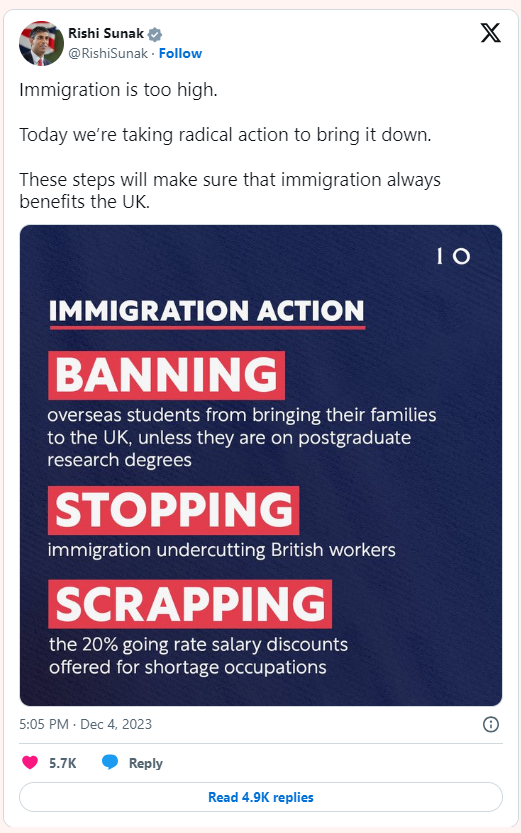Welcome to UK Immigration Navigator, In this article, Rishi Sunak’s approach to international student visas has sparked significant debate and concern within the UK’s higher education sector. The discourse surrounding his policies has been laden with terms like “clampdown” and “boom-and-bust,” reflecting the fluctuating landscape of governmental attitudes toward international students.
Table of Contents
Immigration News: The Political Landscape
Rishi Sunak, the Chancellor of the Exchequer, has been at the forefront of discussions regarding immigration and its impact on various sectors, including higher education. His stance on reducing immigration numbers, as evidenced by his social media posts and public declarations, underscores a significant shift in governmental policy.

Manifesto Promises vs. Current Realities
Under Boris Johnson’s leadership, the Conservative Party pledged to uphold and strengthen the UK’s global standing in higher education. However, recent actions, such as reviewing post-study work visas and banning overseas students from bringing their families to the UK, suggest a departure from these promises.
READ ALSO: PSW Visa
Expert Insights
Experts in the field, including former university leaders and policymakers, have voiced their concerns about the potential repercussions of Sunak’s policies. There is a consensus that these measures could exacerbate what has been termed a “funding crisis” for universities, posing a threat to the stability and reputation of the entire sector.
Boom-and-Bust Policies
The concept of “boom and bust” in international student policies highlights the cyclical nature of governmental approaches. The fluctuating rhetoric and regulatory measures can lead to uncertainty and instability, ultimately affecting the UK’s ability to attract and retain international talent.
READ ALSO: 6 High-Demand Jobs in the UK in 2024
International Perceptions
It is crucial to consider the international ramifications of such policies. Overseas, Sunak’s remarks have been widely reported, prompting concerns about the UK’s commitment to welcoming and supporting international students. The perception of the UK as a welcoming destination for higher education may be at risk due to these developments.
Challenges for Universities
The implications of Sunak’s policies extend beyond immigration numbers. High inflation rates and the government’s freeze on domestic tuition fees have created financial challenges for universities. The potential decline in international student enrolment could exacerbate these difficulties, leading to a full-blown funding crisis.
The Way Forward
Amidst the uncertainty and apprehension, there is a call for clarity and coherence in governmental policies. Stakeholders within the higher education sector are urging policymakers to consider the long-term implications of their decisions and work towards fostering an environment conducive to growth and innovation.
Conclusion
In conclusion, Rishi Sunak’s student visa clampdown has sparked significant debate and concern within the UK’s higher education sector. The shift in governmental policy and the potential implications for universities and international perceptions underscores the need for a nuanced and strategic approach to immigration and higher education policy.
FAQ
1. What is Sunak’s student visa clampdown?
Sunak’s student visa clampdown refers to the series of regulatory measures and policy shifts initiated by Rishi Sunak, the Chancellor of the Exchequer, aimed at reducing immigration numbers, particularly those related to international students.
2. What are the main concerns surrounding Sunak’s policies?
The main concerns revolve around the potential impact on the UK’s higher education sector. Stakeholders fear that stringent visa regulations and restrictions on international students could exacerbate a funding crisis for universities and undermine the country’s global position in higher education.
3. What is meant by the “boom-and-bust” pattern in international student policies?
The “boom-and-bust” pattern refers to the cyclical nature of governmental approaches to international student policies. This term highlights the fluctuating rhetoric and regulatory measures that can lead to uncertainty and instability within the higher education sector.
4. How do Sunak’s policies affect universities?
Sunak’s policies pose financial challenges for universities, including high inflation rates and the freeze on domestic tuition fees. The potential decline in international student enrolment further exacerbates these difficulties, potentially leading to a funding crisis within the sector.
5. What are experts saying about Sunak’s policies?
Experts, including former university leaders and policymakers, have expressed concerns about the repercussions of Sunak’s policies. There is a consensus that these measures could have detrimental effects on the stability and reputation of the UK’s higher education sector.
6. How are Sunak’s policies perceived internationally?
Sunak’s remarks and policy decisions have been widely reported overseas, prompting concerns about the UK’s commitment to welcoming and supporting international students. The perception of the UK as a desirable destination for higher education may be at risk due to these developments.
7. What is the way forward amidst these challenges?
Stakeholders within the higher education sector are calling for clarity and coherence in governmental policies. There is an urgent need for policymakers to consider the long-term implications of their decisions and work towards fostering an environment conducive to growth and innovation in higher education.



